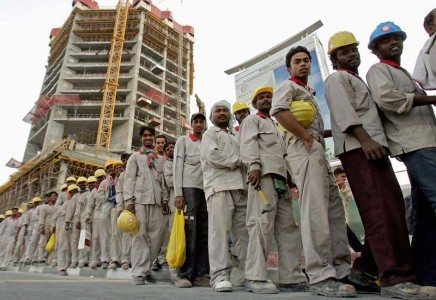“Visas are a rare commodity,” says Raji Daou, deputy general manager at Emeco General Contractors, a multi-divisional construction company in the Kingdom of Saudi Arabia. “The new law has changed the dynamics of the contracting industry and has flushed out the weaker companies. Any company now with visas is definitely in a very strong position.”
Saudi Arabia has inexhaustible manpower and deep pockets – building was a natural orientation. Nevertheless, even the world’s 13th largest country is naturally prone to facing drawbacks and challenges in its conduct of industry, as best evidenced by its recent labour losses and ensuing contractor disputes.
Most of the stoppage in Saudi’s construction market is due to the latter – in their decision-making role, contractors play a pivotal role in construction activities across the GCC.
The government has, over the last few years, implemented a two-pronged approach to increasing Saudi representation in the country’s workforce – cleansing the country’s employment market of illegal immigrant workers (essentially the infamous ‘cheap labour’ of the market), and raising compulsory quotas for the ratio of local Saudis in the country’s private sector.
The country’s Nitaqat programme, aimed at increasing Saudi representation in the private sector, has faced criticism for its detrimental effects on independent, small firms in the country.
“Large firms have no problems regarding foreign labour,” said Fahd Al Hammadi, chairman of the National Contractors’ Commission at the Saudi Chambers Council to Saudi daily Al Hayat in November 2013, “but the medium and small companies have started to suffer.
“Nearly 40% of them have suspended operations while all small firms have stopped,” he added.
However, unsurprisingly, industry giants from within the Saudi market, who wished to remain anonymous, told Big Project ME that the loss of labour has not affected them in any way.
“Construction is continuing as per schedule,” said a site officer who handles operations for a Saudi construction powerhouse. “Slowdown in operations is only up to 15%, which is a fairly negligible rate,” he added.
Ammar Al Asam, executive director of Dewan Architects & Engineers believes the Nitaqat scheme is a positive move.
“The country needed a programme to find solutions for the many immigrants who either illegally enter the country or stay back following the pilgrimage (Hajj),” said Al Asam. “It is their right to insure themselves against a skewed demographic and potential threats to safety & security.
“Saudisation will continue to affect the market in the short term – however, the programme itself is about allowing the young population of Saudi Arabia to enter the market, and in the long run, should focus on education and income generation for those willing to work in the region,” Al Asam adds.
Despite the hurdles – perceived or real – in the Saudi construction sector, the need for infrastructure building in the country is undeniably large. “The need for infrastructure in the country is huge and can’t be estimated,” says Daou. “Saudi Arabia is building to fulfill its current requirements in all sectors, whether commercial, industrial or residential.
“The construction boom here is unstoppable.”
This feature first appeared in Big Project ME’s February 2014 edition. Find the full story here on pages 32-36.

